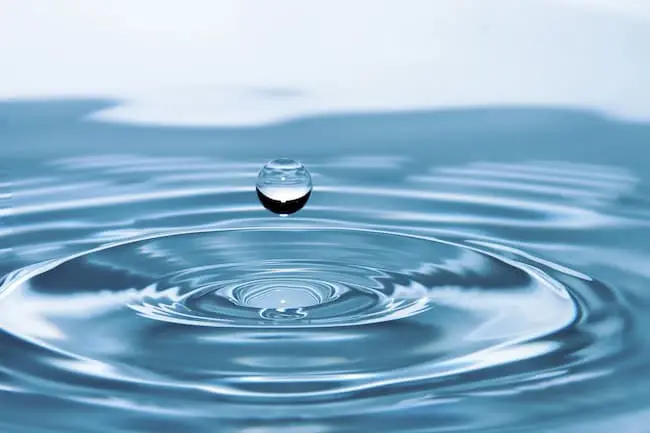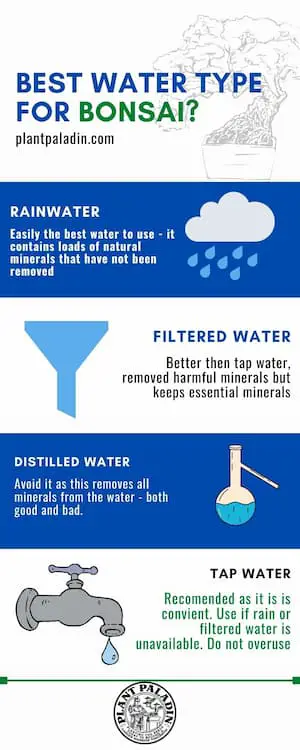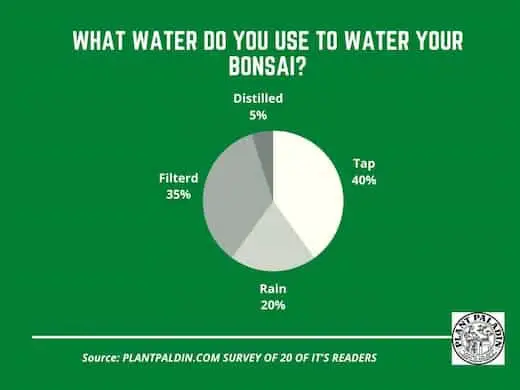This website is supported by its readers. If you click one of my links I may earn a commission. I am also a participant in the Amazon affiliates program and I will also earn a commission from qualified purchases.

Watering is one of the most frequent activities required of you when owning your bonsai tree. While each tree species will have its own watering needs, are some liquids better than others when watering your bonsai? What type of water is best for bonsai?
Rainwater is the best type of water to use when watering your bonsai tree. It contains no added chemicals such as calcium or chlorine, which can impact the PH levels of your bonsai trees’ soil. You can also use tap water, mineral water, or filtered water.
Avoid acidic water such as colas or fruit drinks which can damage your tree.
So how frequently should you water your bonsai tree with different types of water? And why exactly is rainwater the best type of water to use on your bonsai tree? Keep reading to find out more!
Just a quick heads up, over the past three years of running Plantpaladin, hundreds of people have asked for product recommendations. As such, You can find my favorite indoor bonsai tree here (link takes you to Bonsaiboy), my favorite outdoor bonsai tree (link takes you to Bonsaiboy), or have a look at all the products I recommend here.
What type of water is best for bonsai?
One of the big things I struggled with on my bonsai journey was watering my bonsai.
While it seems easy enough (water when it’s dry), the truth is, as a rookie, I had many questions, mainly, what exactly is the best type of water to use for your bonsai?
As such, I got in touch with a few bonsai experts, researched, and even tried to find a few different scientific papers to back up my theories.
All to ensure you have the best post on what type of water is best for bonsai.
To summarise:
- Most neutral waters can be used to water your bonsai tree; this includes tap water, mineral water, rainwater, and filtered water.
- The best water, however, to use would have to be natural rainwater.
- Rainwater contains very few added chemicals that tap water contains, mainly fluoride and calcium.
- If too much tap water is used, this can add calcium to build up in your bonsai tree, causing a change in the solid PH levels.
- This change in PH impacts your bonsai tree’s ability to absorb and distribute nutrients throughout the tree.
- Filtered water has, in some studies, been found to produce thicker, more robust bonsai trees than those watered by regular tap water.
- Mineral water, however, seems to have less of an impact on the benefits of bonsai trees.
- Avoid using fruit juices or cola to water your bonsai trees. These contain more potent acids and chemicals that can cause damage to your bonsai.

Now, this is a lot of information to take into consideration. Let’s explore these in more detail:
What is the best water for a bonsai tree?
One of the best things about bonsai trees is how easygoing many beginner-friendly species are.
Chinese Elm and Ficus, in particular, make great beginner trees simply because it is hard to overcare them.
Any water – so long as it is not too acidic or alkaline can be used for watering your bonsai tree.
This would include tap water, rainwater, mineral water, filtered water, and even pond water for some species.
While these different water types can be used, some types of water do have some advantages over others.
To help show the water type with a ranking out of 10, I’ve made a table below:
Best water for bonsai table
Water type | Rating (out of 10) |
Rainwater | 10 |
Filtered Water | 8 |
Distilled water | 5 |
Tap water | 5 |
Mineral/spring water | 5 |
Pondwater | 5 - 7 depending on tree species |
Fruit juices, cola other soft drunks | 2 |
Rainwater
Without a doubt, rainwater is the gold medalist for the best water type for your bonsai tree.
Other water sources, such as tap water, sometimes contain chemicals such as fluoride as a way to clean the water to be safe for human consumption.
While this can be good for people, it strips back some of the natural goodness in rainwater.
Rainwater then is wholly unfiltered and contains minerals and vitamins that may have been stripped back during the treatment process.
On top of this, rainwater also has a few added benefits, including
- Free to use, so less expensive than other watering methods on this list.
- Environmentally friendly, so you won’t have to worry about calcium deposits building up or changing the surrounding fauna by using rainwater.
- Easy to collect – Place a bucket or rain collector in your yard or garden when it rains and waits till the water pile up.
The only caveat would be acid rain, which typically falls when chemicals enter the atmosphere.
While this is not that common, please don’t use this water on your bonsai as it can cause damage.
Why is rainwater the best?
Rainwater is the best type of water to use in your bonsai tree. It contains no harmful chemicals that can change the PH levels of your bonsai trees soil. Overwatering using rainwater is also incredibly rare, with much rainwater dispersing into the soil.
Filtered water
So next up, we have filtered water.
While rainwater is something, I would recommend if you live in a climate that does not have a lot of rainfall, collecting it can be pretty tricky.
On top of this, not all tap water is created equal, so if you live in a country with a poor water infrastructure or fracking or shale gas operations occur near you, tap water won’t be viable.
Instead, then consider using filtered water.
Not only will filter water strip back any harmful continents in your tap water, but they are also much more convenient than waiting for rainwater.
Now the best water filter you can get will be one that comes directly from your tap – my recommendation would have to be the APEX Mr-2050 which you can check out here (link takes you to Amazon)
It’s relatively inexpensive, and you don’t need a plumber to help get it fitted.

These water filters can be relatively expensive, so using more straightforward hand-operated water filters like a Brita Water Filter (link takes you to Amazon) will also do a fantastic job.
Distilled water
I know what you’re thinking – isn’t filtered and distilled water the same thing?
Not really.
You see, while filtered water puts regular water through a filter that removes chemicals such as fluoride, which harms plants, distilled water removes all the excess material contained in water – including all the good minerals.
Now while there is nothing inherently wrong with using distilled water, you won’t be getting any added benefits from using distilled water either.
On top of this, some studies have found that prolonged use of distilled water over time can result in brown spots on the leaves of your bonsai and a weaker tree overall, leading to stunted growth.
A problem if you want to grow an imperial-sized bonsai tree in as short a time as possible.
Tap water
The most common type of water we will use for our bonsai trees is tap water.
While there are better types of water on this list, tap water will be the easiest to use from a pure convenience standpoint.
Now the fluoride in tap water, if left unchecked, will eventually cause the PH level in your soil to build up and cause calcium to build up in your tree.
Tap water often contains other vital minerals that tend to offset some of the more severe side effects.
Potting soil will also ensure your tree gets any vital minerals that may have been stripped by tap water.
For example, I’ve been watering my bonsai trees for around two years with tap water and have not noticed any significant side effects.
As such, I recommend using tap water around 70% of the time if no other water source is available or convenient for you.
Mineral water, spring water, or bottled water
In theory, this should be the best type of water to use for your bonsai on the list.
After all, natural spring contains (depending on the type of spring) loads of fantastic minerals that your bonsai tree can benefit from.
Most of us won’t be hiking up mountains ourselves to get mineral or spring water and instead rely on bottled versions.
Sadly, due to the mineral water processing, only trace amounts of the valuable mineral can be found in most bottle-watered brands, so I would avoid using these to water your bonsai tree.
If anything, if you consistently use bottled water to water your bonsai tree, eventually, the microplastics will be passed into your tree, causing more harm than good.
Avoid where you can.
Pondwater
I know what you’re thinking.
Who the hell watered their bonsai tree with pondwater?
Not a lot of people, to be honest!
I would not recommend doing this with most bonsai species; regular tap water or rainwater will be the way to go.
If you own a bonsai tree that requires a lot of watering or is already used to soaking up pond water, then watering with it might not be such a bad idea.
One example would be willow trees which often only really need water to grow into healthy trees, let alone bonsai.
Test out pondwater on your bonsai to see how it gets on.
If you discover that your tree has a mold or bacterial infection, avoid it.
Colas and fruit juices
While I’ve never watered my bonsai tree with colas, fizzy drinks, or fruit juices, I would avoid doing so.
These drinks often contain excessive amounts of sugar, salt, and contaminants that can drastically impact the PH level of your tree.
Surgery drinks, in particular, can also attract insects such as ants or aphids, leading to insect infestation.
What does the science say?
Now I didn’t want just to give anecdotal information and so I found a few studies on the best water to use on bonsai:
Katy steppe et al
In a 2018 journal found in the tree psychology journal – Steppe et al. noticed that certain tree species had more considerable growth under rainwater than regular bottom watering.
Brawn and Benson 2016
Increased rainfall due to climate change will result in a giant tree – showing that rainfall, unlike other water types, directly impacts the size and speed a tree will grow too.
Should I water my bonsai tree with distilled water?
You should not use distilled water to water your bonsai tree. Distilled water has all of its nutrients removed. Prolonged use of distilled water can result in brown spots on your tree’s leaves and stunted growth.
Use rainwater, tap water, or filtered water on your bonsai for the best results.
Can you use tap water to water a bonsai?
Tap water can be used regularly to water a bonsai tree without any significant side effects. Prolonged use of tap water can change the soil’s PH level or cause a build-up of salts in the topsoil so consider using a water filter or rainwater every few weeks for best results.
Does water type matter when watering bonsai?
So when reading this post, your might be thinking that using any water that is not rainwater or filtered water will kill your tree instantly.
The truth is that while there are benefits to using certain types of water, most bonsai tree species are incredibly resilient.
As such, so long as you water your bonsai tree frequently with relatively clean water, you should have a healthy bonsai tree that lives a happy, long life.
How frequently should you water your bonsai tree?
Most bonsai trees will need to be watered once to twice per week during the spring and summer. Check your topsoil; if dry to touch for most species of bonsai, then your bonsai tree needs watering.
The amount of watering your bonsai tree will vary from species to species, so check out the table below or my post on how to water a bonsai tree here.
Watering bonsai tree by species
Bonsai Species | How often should topsoil be checked | How often should the bonsai tree be watered |
Weeping Willow | A few times per day | Daily |
Birch | A few times per day | Daily |
Alder | A few times per day | Daily |
Apple | Once per day | A few times per week when not producing fruit. Daily when producing fruit. |
Lemon | Once per day | A few times per week when not producing fruit. Daily when producing fruit. |
Lime | Once per day | A few times per week when not producing fruit. Daily when producing fruit. |
Orange | Once per day | A few times per week when not producing fruit. Daily when producing fruit. |
Crabapple | Once per day | A few times per week when not producing fruit. Daily when producing fruit. |
Cherry | Once per day | A few times per week when not producing fruit. Daily when producing fruit. |
Ficus | Once per day | Daily to a few times per week. |
Chinese Elm | Once per day | Daily to a few times per week. |
Fukien Tea | Once per day | Daily to a few times per week. |
Serissa | Once per day | Daily to a few times per week. |
Olive | Once per day | Daily to a few times per week. |
Juniper | Once per day | Daily to a few times per week. |
Pine | Once per day | Daily to a few times per week. |
Scots Pine | Once per day | Daily to a few times per week. |
Oak | Once per day | Daily to a few times per week. |
Jade | Once per day | Daily to a few times per week. |
As with most plants, bonsai trees will need more watering during warm hot summers than during the winter.
Check your bonsai tree solid two to three times per day during the summer if you live in arid conditions to ensure your tree does not dry out.
Can you overwater your bonsai tree?
Overwatering bonsai trees is widespread and should be avoided at all costs. Overwatering your bonsai can lead to mold and fungal infections in bonsai species. To prevent this, never water your bonsai tree if the topsoil is still wet or moist to the touch.
Read up on what to do if you have overwatered your tree. Check out my post here.
What species of bonsai need water?
All bonsai tree species need watering at least once to twice per week during the spring and summer growing seasons. Species such as willow will need watering daily for best results. Succulent species such as Jade require much less watering and can get by on being watered once per week.
How to feed your bonsai water?
To feed your bonsai water, touch the topsoil to ensure it is dry. Fill a watering can with cold water – preferably tap, filtered, or rainwater. Water directly on the top of your bonsai leaves for 20 seconds to 1 minute.
When the water passes through to the drainage holes of your bonsai, stop watering.
Bottom watering can also be undertaken during prolonged periods when you are away from your bonsai, such as when you are on holiday.
Survey results
Finally, I surveyed 20 plant paladin readers and asked them what type of water they use on their bonsai trees.
To summarize:

My top picks for the gear you will need!
So like I mentioned earlier, over the past three years of running PlantPaladin, hundreds of people have asked me for my recommendations on the best bonsai gear on the market.
Having spent thousands of dollars on bonsai items these past few years and tested at least 100 bonsai-specific products, I’ve listed my favorite products below – All of which I highly recommend and think you can get great value.
They can purchase directly by clicking the link to take them to Amazon.
Bonsai Tool Set: One of the significant challenges I’ve had is finding a toolset that was not only durable but didn’t break the bank. SOLIGT has recently developed a fantastic bonsai tool set that covers all the tools you need to trim, prune, and repot your trees. – You can grab it here.
Complete Bonsai Set: Many of you will want to grow your bonsai trees entirely from scratch, but finding the varicose seeds, pots, and other items in one place can be challenging. Leaves and Sole then have created a complete bonsai set that I’ve personally used that ticks all the boxes. You can grab it here.
Bonsai wire: The number of times I’ve run out of wire for my bonsai or purchased cheap bonsai wire that doesn’t do the job is embarrassing for me to admit. After a lot of trial and error, I found that using Hotop’s aluminum bonsai wire is one of the best options on the market. This can easily be used for both indoor and outdoor bonsai. You can grab it here.
This post was written by Fehed Nicass who has been passionate about bonsai for over 3 years. He currently resides in the UK and works in sales.

